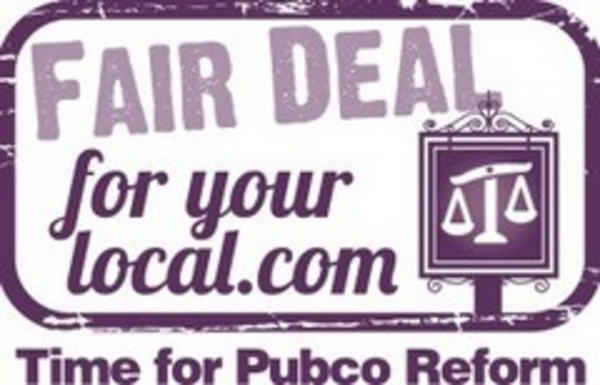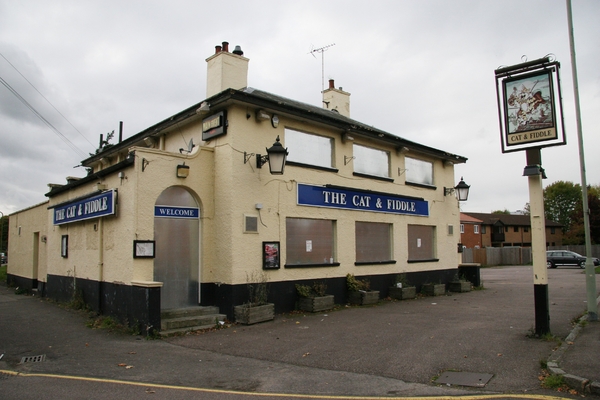Pubcos drinking in Last Chance Saloon
Added: Saturday, September 28th 2013

Pubs are falling as fast as the autumn leaves, at a rate of 26 a week, ripping the hearts out of local communities. We await the response by Business Secretary Vince Cable to the demand by publicans and consumers for tough action to tackle the giant national pub companies whose activities – in no small measure – are responsible for many pub closures.
Will we be fobbed off yet again – told that a “free market” is working well, that competition ensures there are many companies, large and small, running pubs, and no action is needed? If so, Dr Cable and his parliamentary colleagues should leave the cloisters of Westminster and walk round the streets of a few towns and cities. They will see at first hand the boarded-up pubs or the smart new houses that have replaced perfectly viable hostelries.
People go to pubs to do far more than drink. They meet friends and they enjoy a meal. They offer solace to the lonely. With energy prices in the headlines, pubs offer warmth to those who struggle to heat their homes.
Pubs are often part of the history and culture of British society. In St Albans, where I live, the Boot and the Old Fighting Cocks are two of the oldest inns in England and are rich in history and folk lore.
And pubs also make an important contribution to the economies of their communities. They inject an average of £80,000 each into their communities every year.
The reasons for pub closures are complex. A lot of attention has been given – rightly – to the grossly unfair competition from supermarkets that sell beer so heavily discounted that the prices are sometimes less than the cost of production. But less notice has been given to the role of giant pub-owning companies that close perfectly viable pubs in order to profit from their sale to property companies.
The pattern of pub-owning in Britain has changed out of all recognition in the past few decades. Pubs used to be owned in the main by breweries. But government action in the early 1990s followed a Monopolies Commission report that showed that the large national brewers acted as a cartel, fixing prices and charging far more for beer than smaller competitors.
As a result of sweeping changes brought in by the government of the day, most of the big brewers sold their pub estates to new pub-owning companies, known as “pubcos” for short.
A devastating report published at the end of September by the Fair Deal for Your Local Campaign reveales the full horror of the grip of Britain’s pubs by the two biggest pubcos, Enterprise Inns and Punch Taverns. Fair Deal for Your Local is run by publicans with the full backing of CAMRA, the Campaign for Real Ale, the Parliamentary Save the Pub Group and the GMB trade union.
The report says: “Figures over the last four years expose the calamitous reality of the pubco business model, with a staggering third of pubs owned by the two largest pubcos being sold off in just four years.”

It goes on to say that Enterprise and Punch have between them disposed of more than 5,000 pubs between 2008 and 2012 – that’s 33% of their outlets. In 2008 Enterprise owned 7,763 pubs. By 2012 this figure had fallen to 5,720.
In 2008 Punch owned 7,560 and that number had declined to just 4,529 pubs by 2012.
The reason for this catastrophic state of affairs has nothing to do with people no longer drinking in pubs. In many cases, perfectly viable and profitable pubs have been sold as a result of the crazy way in which the pubcos are run.
The Fair Deal report accuses the two companies of “slash and burn” tactics. “They have been asset stripping in a desperate attempt to pay off the extraordinary level of debt they are in. This debt accumulated after a period of reckless empire building, over-evaluation of their estates and over-borrowing against that value.”
To emphasise the point, the report adds that in 2012 Enterprise had a net cash flow from its pubs of £296 million but in same year its debt and interest payments totalled £430 million. As a result of this £134 million shortfall, the company has resorted to selling off pubs, regardless of the interests of pubgoers and their communities.
The pubcos “business model” sometimes appears to be have been lifted from the Theatre of the Absurd. In Ipswich, Enterprise declared the Dove pub to be “unviable” and planned to close it. The sitting tenants, Ady Smith and Karen Beaumont, were able to raise the cash to buy the Dove and prove the pubco wrong. The pub has thrived ever since. It sells a wide range of cask beers, mainly from local independent breweries, and a large marquee has been added at the back to house regular beer festivals. Ady and Karen have now installed an in-house micro-plant to produce their own beer in order to give even greater choice to their legion of customers. The Dove, without question, is now the most popular and successful pub in Ipswich.
In the village of Sandridge in Hertfordshire, Enterprise leased the Rose & Crown to the small pub company Oak Taverns. Oak specialises in running pubs that offer a wide choice of local ales along with good food. The Rose & Crown thrived but Enterprise rained on the parade by tripling the rent. As a result Oak Taverns couldn’t make a living from the pub and pulled out.
The rent burden is at the heart of the Fair Deal for Your Local’s submission to the Business and Enterprise Department’s investigation of the pubcos. It urges Vince Cable to bring in a Statutory Code for the pubcos, as self-regulation has all too clearly failed. Fair Deal wants independent arbitration to fix fair rents for licensees and it also wants a provision for a “free of tie” rent that would enable publicans to source beers from other suppliers. Most pubco licensees are tied to the pubco beer list and as a result are not able to the range of beers demanded by consumers.
Will the Business and Enterprise Secretary listen and act? A cable can be a lifeline...
*Photo above shows the Cat & Fiddle in Hatfield, Herts. It was the closest pub to the giant Galleria shopping complex but it closed earlier this year and is now a group of flats and houses. Photo courtesy Welwyn Hatfield Times.
www.fairdealforyourlocal.com






